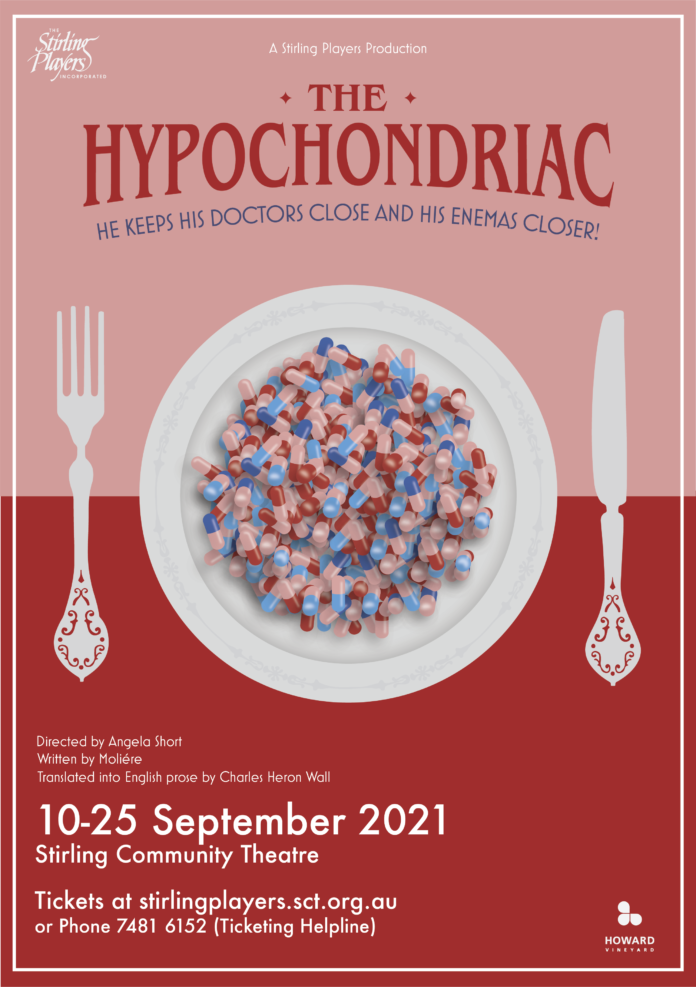From the very start of opening night, while one thumbed through the program and wryly smiled at the mug shots of the cast and creatives – some masked, others engaged in dubious medical procedures – one knew that director Angela Short’s production of The Hypochondriac for The Stirling Players was going to be tongue in cheek, and it was, very firmly.
Written in 1673 by Moliere under the original title La Malade Imaginaire (The Imaginary Invalid), the action follows Argan (played by David salter) who believes he is constantly ill when he is not. His physicians and apothecaries (Simon Barnett, Tim Williams and Joshua Coldwell) take full advantage of his hypochondria and prescribe all manner of concoctions and cures. Argan has arranged for his daughter Angelique (Lucy Johnson) to marry Thomas Diaforius (Connor Ferguson), but she is in love with Cleante (also played by Barnett). Thomas is on the verge of graduating as a doctor, but he is unbelievably boring, socially stunted and ill-suited to the human race let alone to Angelique. With Angelique married to a doctor, Argan reasons he will receive free medical care. In this adaptation of the play, Belle (Lindy LeCornu), Argan’s sister, conspires with Argan’s maid Toinette (Nicole Rutty) to cure him of his hypochondria and, through an elaborate ruse, to identify which of his family really do love and care for him. It proves not to be Beline (Georgia Stockham), his second wife, who is squarely only after his riches. In the end, Angelique shows herself to be a loving and loyal daughter and Argan then gives his blessing for her to marry Cleante. [Moliere’s original includes Argan’s brother Beralde, rather than a sister.]
If you think this all sounds a bit silly, fun, and farcical, then you’re in tune with the whole piece, but the play does have some serious messaging if you listen for it, such as the differing expectations different social classes have about medical professionals, which is apposite in our COVID riddled times!
Angela Short has made some interesting directorial decisions with variable success. Intruding aspects of the pantomime tradition raised a smile (hearty laughs also) but wore thin, such as characters being tagged with signature tunes heralding their entrances on stage, and anachronistic stage properties not being entirely milked for their farcical potential, such as a Dummies Guide to 17th Century Law, which was an amusing touch! The decision to have every cast member employ a different accent was an unwelcome distraction, with harsh aussie brogue grating up against lilting Scots/Irish, mellifluous American, and haughty French resulting in a disruption of the natural meter of the text, which persists to an extent even in a translation.
Bob Peet’s set design was spot on, and for two hours we could have been in a seventeenth century Parisian gentleman’s boudoir. Choices of colour and decoration were tasteful and elegant. Costume design by Val Hancock and Gil Cordell was a highlight, with careful attention to detail, to the period and most importantly to the characterisation. The wigging and costumes worn by Ferguson and Williams as Diaforius senior and junior were a highlight. Costumes don’t make the character, but they certainly help if done well. Lighting by Tim Williams and Paul Tossell was simple but effective, and the use of wall mounted sconces was a nice touch. Tossell’s sound design was at times cliche but suited Short’s overall design concept. Phil short’s original music for the penultimate scene was evocative and very well executed, and was another in a longish list of surprises by Short.
The hard-working cast was energetic throughout and the energy never flagged as they crafted a diverse array of stylized stock-characters in the commedia dell’arte style. (Sometimes this bumped awkwardly against pantomimesque characterisations.) David Salter created an abrasive and boorish Argan, and his slow retreats across stage to the wings to ‘relieve stricken nature’ in the water closet were very funny – a case of less is more! Georgia Stockham was quite simply over-the-top and played the panto dame traits of her role for all they were worth, and some. Lucy Johnson was a picture of sweet innocence without being mawkish, and Simon Barnett was suitably differentiated in his dual roles. Displaying the first flushes of ardent romance, he worked well with Johnson. Connor Ferguson showed not insubstantial skill in creating an almost dead-pan Thomas Diaforius, and Tim Williams’ attempts to sit on a low set chair was a brief but very funny bit of farcical nonsense that could have been exploited a little more! Lindy LeCornu enjoyed her two gender-reversing roles and again showed us why she is one of Adelaide’s favourite character actors.
Proving there is no such thing as a small role, Joshua Coldwell was excellent as Mr Purgon. He played the role with unwavering imperiousness and almost sucked the stage dry of oxygen with his bravura stylized performance.
Nicole Rutty was most successful in getting into the very essence of the style of the play and showed great understanding of commedia stock characters. She was surly, vindictive, duplicitous, underhanded, and conniving as required. Butter wouldn’t melt in her mouth – it would boil! And all the time there was an inscrutable smile on her face!
Angela Short’s experiment with mashing together different styles of theatre was bold, and the result clearly titillated the enthusiastic opening night audience.



